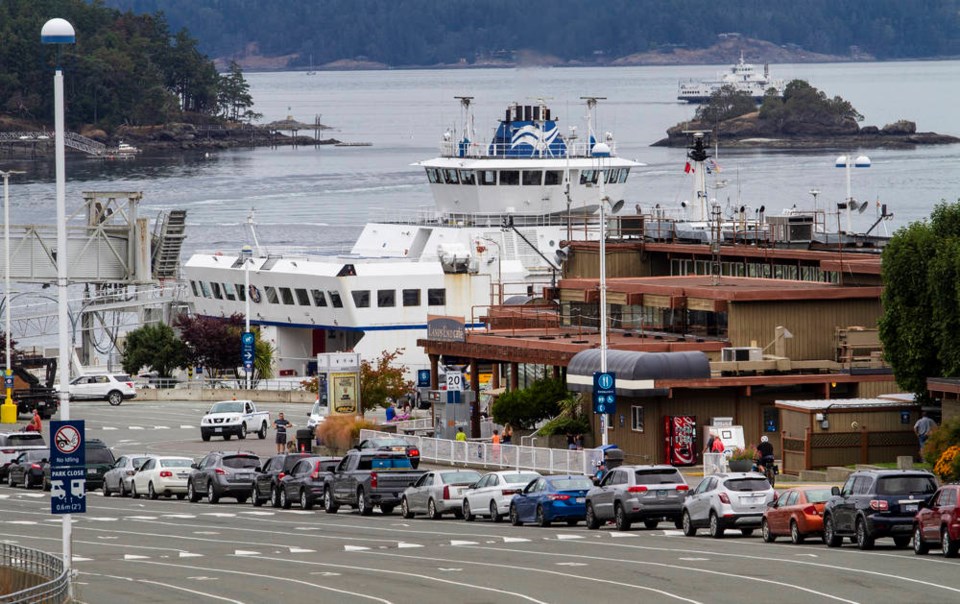A number of readers have wondered why B.C. Ferries is laying on 23 extra sailings over the Christmas period. Isn’t non-essential travel discouraged?
The answer to that question is yes, but it is only discouraged, not forbidden. While the provincial health officer has asked people not to travel unless absolutely necessary — for a doctor’s visit, for example, or for work — Dr. Bonnie Henry has not issued an outright ban.
Many Vancouver Islanders find this hard to understand. If we are prohibited from having friends over for Christmas dinner outside our “core bubble,” why can visitors from the mainland, where COVID-19 is much worse, come here at their own discretion?
The same question might be asked about air travel. More than one million Canadian air passengers have entered the country since the outbreak began.
Yes, they are required to self-isolate for 14 days. But other than for essential reasons, why are we allowing people to fly back and forth to other countries while the epidemic continues?
Indeed, carrying the point further, there have been more than six million entries into Canada by land since our borders were closed to foreigners visiting for non-essential reasons.
More than half of those crossings were by truckers bringing food and other necessities. No argument there.
And some involved workers who reside in Canada but require daily trips to work in the United States. Again no argument there, though both groups are exempt from the 14-day quarantine order.
But the impression remains that travel restrictions, by and large, are less rigorous, and more easily got around, than some of the other COVID fighting measures we all live with.
Doesn’t that undo much of the communal spirit we need to get through this together?
There is, in fairness, some basis for the more lenient approach to travel. There are almost countless reasons why people undertake trips.
Sorting them all out, and drawing distinctions between them, would be a mammoth undertaking.
Then again, supposing we drew up a list of unnecessary trips and prohibited them, could we expect B.C. Ferries staff to enforce such a regime?
What kind of documentation would travellers have to provide, to show their trip is essential?
A letter from your doctor? Certainly do-able, though there are privacy issues to consider.
But a letter, say, from a dying mother? Hard to envisage, and harder still to verify.
Orders that cannot in practice be enforced are worse than no orders at all. They merely bring the whole process into disrepute.
Still, the concern persists. It’s difficult to believe that a surge in ferry traffic over the holiday period is due entirely to essential trips.
Yes, some will involve the transport of additional goods and services needed at such a time. And courier firms are working full out as people order Christmas presents online.
But carloads of adults with kids is another matter. It appears likely that some of those travellers are risking the health of others for reasons that almost certainly don’t stand scrutiny.
Moreover, as Steve Wallace revealed on these pages last week, ICBC is helping residents from the Lower Mainland book driving tests in Victoria because wait times are shorter. During just one week in November, 27 clients were referred to Victoria. The full number must be in the hundreds.
That a Crown corporation should be engaged in circumventing the provincial health officer’s pleas is unacceptable. Joy MacPhail chairs the ICBC board. As a former senior minister in NDP administrations during the 1990s, she must realize how damaging this is.
We saw the surge in COVID infections that followed the Thanksgiving weekend. The last thing we need is a repeat of that experience now.
And the threat here is not only to health and well-being. The longer the epidemic continues — and despite the arrival of the vaccine, there is no end in sight — the more public frustration will grow with continued lockdowns.
This is the real danger. People can put up with a lot in the common good, so long as they believe the burden is equally shared.
The travel restrictions, as they stand at this moment, create the impression that some limitations are being imposed more strenuously than others.
By all means let Henry reinforce her warnings that people should behave responsibly. But at the same time, it’s up to each of us to heed those warnings, and consider the well-being of others, not just our own.



